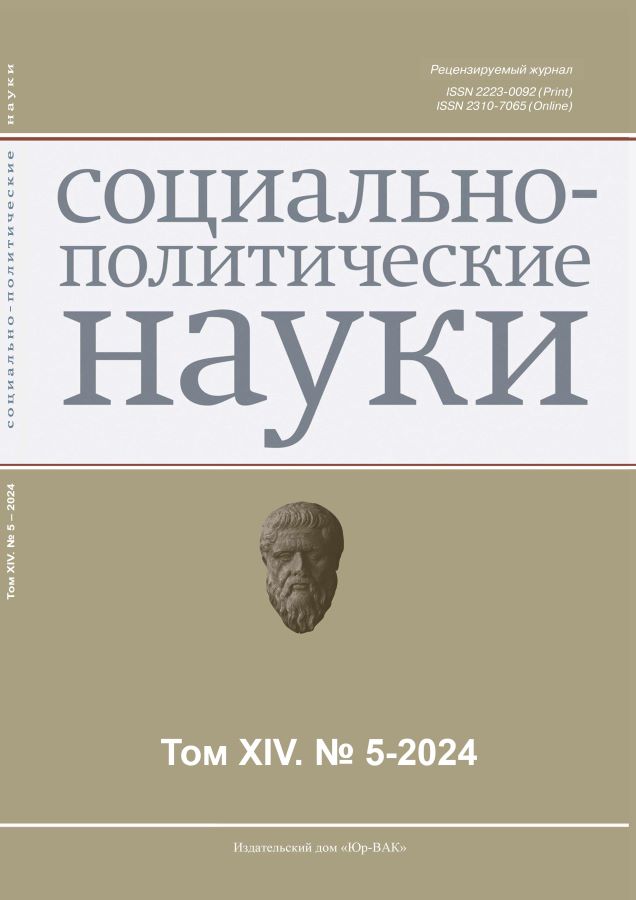Artificial intelligence – towards regulation in the global world
- Авторлар: Zagaynov M.R.1
-
Мекемелер:
- Financial University under the Government of the Russian Federation
- Шығарылым: Том 14, № 5 (2024)
- Беттер: 120-126
- Бөлім: International Relations, Global and Regional Studies
- URL: https://journals.eco-vector.com/2223-0092/article/view/655524
- DOI: https://doi.org/10.33693/2223-0092-2024-14-5-120-126
- EDN: https://elibrary.ru/RXBMFE
- ID: 655524
Дәйексөз келтіру
Аннотация
The development of scientific and technological progress in the context of the transformation of international relations in the 21st century have brought to the forefront the problem of attitudes towards artificial intelligence in the world. Issues of ethics, law, attempts to formulate their vision of the situation are characteristic not only of states, but also of international organizations. The author of this study aimed to assess the activities of universal and regional international organizations in the field of resolving issues related to the work of artificial intelligence in international relations. The topic of artificial intelligence has undoubtedly long acquired a global character. The emergence of new threats and challenges to humanity undoubtedly poses a dilemma for the world community about the role that artificial intelligence will play in these processes. Will this be a creative embodiment, or will artificial intelligence be destructive? The answer to this question has not yet been found. Nevertheless, we can talk about the responsibility of international organizations, and the fact that now active actions are being taken to consolidate norms regarding artificial intelligence. For example, the United Nations, being a universal international organization, could not ignore the phenomenon of artificial intelligence, as well as regional organizations. In this context, it seems particularly relevant to analyze the first steps that are being taken in this direction, especially given the complex international relations between Russia and unfriendly states and organizations. All this is necessary to understand all the changes in the situation related to artificial intelligence on the world stage.
Толық мәтін
Авторлар туралы
Mikhail Zagaynov
Financial University under the Government of the Russian Federation
Хат алмасуға жауапты Автор.
Email: ni22nn@mail.ru
ORCID iD: 0000-0002-8913-849X
SPIN-код: 7299-4810
Cand. Sci. (Econ.), head teacher
Ресей, MoscowӘдебиет тізімі
- Arzumanyan A.B. Artificial intelligence and human rights: The strategy of the Council of Europe. Bulletin of the Faculty of Law of the Southern Federal University. 2021. Vol. 8. No. 4. Pp. 21–25. (In Rus.)
- Bondarenko V.M. Technological development, information society, artificial intelligence: The present and the future of Russia and the world. Information Society. 2023. No. 6. Pp. 2–12. (In Rus.)
- Katanandov S.L., Kovalev A.A. Technological development of modern states: Artificial intelligence in public administration. State and Municipal Management. Scientific Notes. 2023. No. 1. Pp. 174–182. (In Rus.)
- Kashkin S.Yu., Pokrovsky A.V. Artificial intelligence, robotics and human rights protection in the European Union. Bulletin of the O.E. Kutafin University (MGUA). 2019. No. 4 (56). Pp. 64–90. (In Rus.)
- Lyubimov A.P., Ponomareva D.V., Barabashev A.G. Artificial intelligence in the European legal doctrine. Bulletin of the Diplomatic Academy of the Ministry of Foreign Affairs of Russia. International Law. 2019. No. 1 (10). Pp. 32–47. (In Rus.)
- Petrochenkov I.A. Prospects for the protection of human rights in the context of the adoption by the European Union of the regulation on artificial intelligence. Citizen. Elections. Power. 2024. No. 2 (32). Pp. 104–115. (In Rus.)
- Ustinovich E.S. Artificial intelligence in healthcare. Social Policy and Social Partnership. 2024. No. 1. Pp. 34–43.
- Brey P., Søraker J.H. Philosophy of computing and information technology. In: Philosophy of technology and engineering sciences. Handbook of the philosophy of science. 2009. Pр. 1341–1407.
- Gilbert S. The EU passes the AI Act and its implications for digital medicine are unclear. npj Digital Medicine. 2024. No. 7. Art. number 135. URL: https://www.nature.com/articles/s41746-024-01116-6
- Holloway C., Hand H.H. Who’s running the store, anyway? Artificial intelligence!!! Business Horizons. 1988. No. 31 (2) Pp. 70–76.
- Kaplan A., Haenlein M. Siri, Siri, in my hand: Who’s the fairest in the land? On the interpretations, illustrations, and implications of artificial intelligence. Business Horizons. 2018. No. 62. doi: 10.1016/j.bushor.2018.08.004.
- Solomonoff R. The time scale of artificial intelligence: Reflections on social effects. Human Systems Management. 1985. No. 5. Pр. 149–153.
Қосымша файлдар








